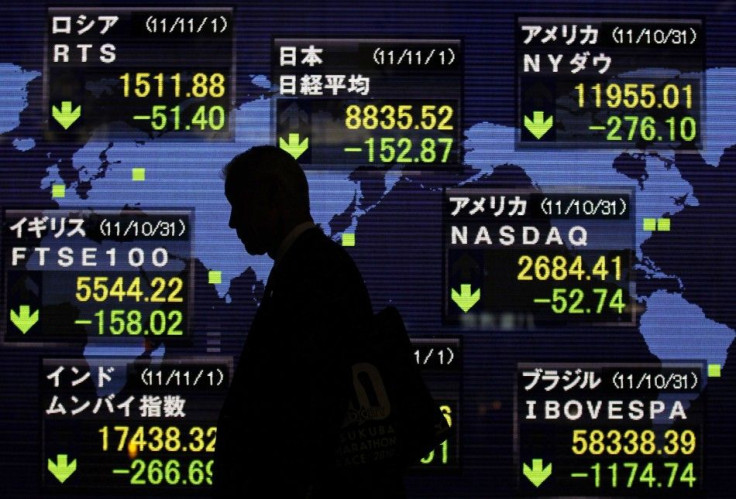Asia's Markets Close Mixed Tuesday as Europe Concerns Continue

(Reuters) - Southeast Asian stock markets were mixed with an easier bias on Tuesday as market players cashed in any quick gains and remained focused on risks attached to the unresolved sovereign debt crisis in the euro zone.
Late selling pulled some markets down from early highs but volume was light because of the holiday season.
Jakarta's Composite Index gave up an early rise to a one-week high, ending down 0.5 percent, while Singapore fell 0.14 percent and has now lost 18 percent this year.
At 0900 GMT, the benchmark Thai SET index was up 0.18 percent but below an intraday two-week high struck earlier.
With such volatility in Asian markets, all we can look forward to is window-dressing by next week, said Jakarta-based analyst Purwoko Sartono of Panin Sekuritas.
The Philippine index edged up 0.6 percent, closing at its highest since Nov. 17. Manila reported $47 million in foreign inflows in the three session to Monday, according to Thomson Reuters data.
Big Asian markets, including Japan's Nikkei average, rose as players bought back shares that had been sold after news on Monday of the death of North Korean leader Kim Jong-il.
MSCI's broadest index of Asia-Pacific shares outside Japan inched up 0.12 percent by 0835 GMT.
Olympus jumped by it daily limit of 150 yen to 1,065 yen and was the top percentage gainer on the Nikkei average, which closed up 0.5 percent to 8,336.48.
Buying from Japanese pension funds also lifted Tokyo shares, though market participants do not expect the Nikkei to rise beyond recent trading ranges in the coming weeks, given worries about the impact of euro zone debt woes on global growth, and thin trading volumes ahead of the holidays.
Only 1.17 billion shares changed hands on the main board, the lowest level for this year.
I doubt that worries about the debt crisis will disappear in January. Investors will still think there's no reason to buy stocks, said Hideyuki Ishiguro, assistant manager of investment strategy at Okasan Securities.
The 25-day moving average near 8,465 was seen as key resistance, while Yumi Nishimura, senior technical analyst at Daiwa Securities, cited 8,400 as another level to watch.
Yesterday's selling was part of the initial shock after the news out of North Korea and today, the market is up on broad short-covering, said Nishimura.
A rebound in Korean shares on Tuesday also created a sense of relief among players that the market may have overreacted to the news.
The broader Topix index gained 0.3 percent to 718.49, with the 700 mark seen as a major support after that level held last month on heavy buying from Japanese trust banks.
In Bangkok, weak November trade data dampened sentiment in manufacturing shares, with electronic component maker Hana Microelectronic Pcl falling 1 percent and auto-parts maker Somboon Advance Technology Pcl easing 0.5 percent.
Thailand reported a 12.4 percent contraction in exports in November from a year before and a 67.5 percent plunge in car sales as a result of severe flooding.
But Thai banks edged up 0.5 percent after Fitch Ratings said its outlook on the big lenders was stable despite the impact of severe flooding and potential risks from a global economic slowdown.
In contrast, Malaysian bank CIMB Group Holdings Bhd eased 2.1 percent.
A Fitch upgrade of Indonesian banks on Monday continued to lend support to financial shares there, with PT Bank Rakyat Indonesia Tbk, among the upgraded banks, rising 1.5 percent.
(Additional reporting by Mari Saito in Tokyo and by Andjarsari Paramaditha in Jakarta.)
© Copyright Thomson Reuters 2024. All rights reserved.











